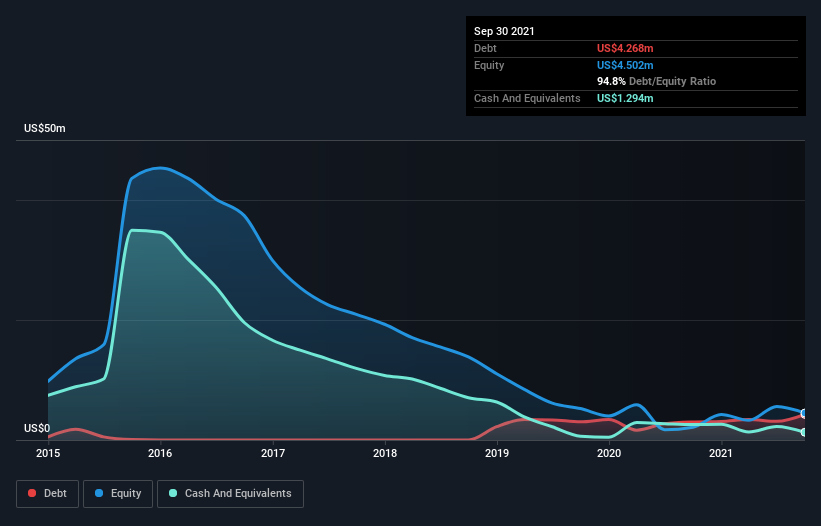
Some say volatility, rather than debt, is the best way to think about risk as an investor, but Warren Buffett famously said that 'Volatility is far from synonymous with risk.' It's only natural to consider a company's balance sheet when you examine how risky it is, since debt is often involved when a business collapses. As with many other companies Energy Focus, Inc. (NASDAQ:EFOI) makes use of debt. But is this debt a concern to shareholders?
When Is Debt Dangerous?
Debt and other liabilities become risky for a business when it cannot easily fulfill those obligations, either with free cash flow or by raising capital at an attractive price. Part and parcel of capitalism is the process of 'creative destruction' where failed businesses are mercilessly liquidated by their bankers. While that is not too common, we often do see indebted companies permanently diluting shareholders because lenders force them to raise capital at a distressed price. Having said that, the most common situation is where a company manages its debt reasonably well - and to its own advantage. When we think about a company's use of debt, we first look at cash and debt together.
View our latest analysis for Energy Focus
What Is Energy Focus's Debt?
The image below, which you can click on for greater detail, shows that at September 2021 Energy Focus had debt of US$4.27m, up from US$3.01m in one year. However, it does have US$1.29m in cash offsetting this, leading to net debt of about US$2.97m.

A Look At Energy Focus' Liabilities
We can see from the most recent balance sheet that Energy Focus had liabilities of US$8.57m falling due within a year, and liabilities of US$30.0k due beyond that. Offsetting these obligations, it had cash of US$1.29m as well as receivables valued at US$1.63m due within 12 months. So it has liabilities totalling US$5.68m more than its cash and near-term receivables, combined.
This deficit isn't so bad because Energy Focus is worth US$23.9m, and thus could probably raise enough capital to shore up its balance sheet, if the need arose. However, it is still worthwhile taking a close look at its ability to pay off debt. There's no doubt that we learn most about debt from the balance sheet. But ultimately the future profitability of the business will decide if Energy Focus can strengthen its balance sheet over time. So if you're focused on the future you can check out this free report showing analyst profit forecasts.
Over 12 months, Energy Focus made a loss at the EBIT level, and saw its revenue drop to US$11m, which is a fall of 33%. That makes us nervous, to say the least.
Caveat Emptor
Not only did Energy Focus's revenue slip over the last twelve months, but it also produced negative earnings before interest and tax (EBIT). Its EBIT loss was a whopping US$7.3m. When we look at that and recall the liabilities on its balance sheet, relative to cash, it seems unwise to us for the company to have any debt. So we think its balance sheet is a little strained, though not beyond repair. Another cause for caution is that is bled US$9.7m in negative free cash flow over the last twelve months. So suffice it to say we consider the stock very risky. There's no doubt that we learn most about debt from the balance sheet. But ultimately, every company can contain risks that exist outside of the balance sheet. For example, we've discovered 5 warning signs for Energy Focus (1 is concerning!) that you should be aware of before investing here.
When all is said and done, sometimes its easier to focus on companies that don't even need debt. Readers can access a list of growth stocks with zero net debt 100% free, right now.
Valuation is complex, but we're here to simplify it.
Discover if Energy Focus might be undervalued or overvalued with our detailed analysis, featuring fair value estimates, potential risks, dividends, insider trades, and its financial condition.
Access Free AnalysisHave feedback on this article? Concerned about the content? Get in touch with us directly. Alternatively, email editorial-team (at) simplywallst.com.
This article by Simply Wall St is general in nature. We provide commentary based on historical data and analyst forecasts only using an unbiased methodology and our articles are not intended to be financial advice. It does not constitute a recommendation to buy or sell any stock, and does not take account of your objectives, or your financial situation. We aim to bring you long-term focused analysis driven by fundamental data. Note that our analysis may not factor in the latest price-sensitive company announcements or qualitative material. Simply Wall St has no position in any stocks mentioned.
About NasdaqCM:EFOI
Energy Focus
Designs, develops, manufactures, markets, and sells energy-efficient lighting systems, and controls and ultraviolet-C light disinfection products in the United States and internationally.
Excellent balance sheet low.
Similar Companies
Market Insights
Community Narratives




